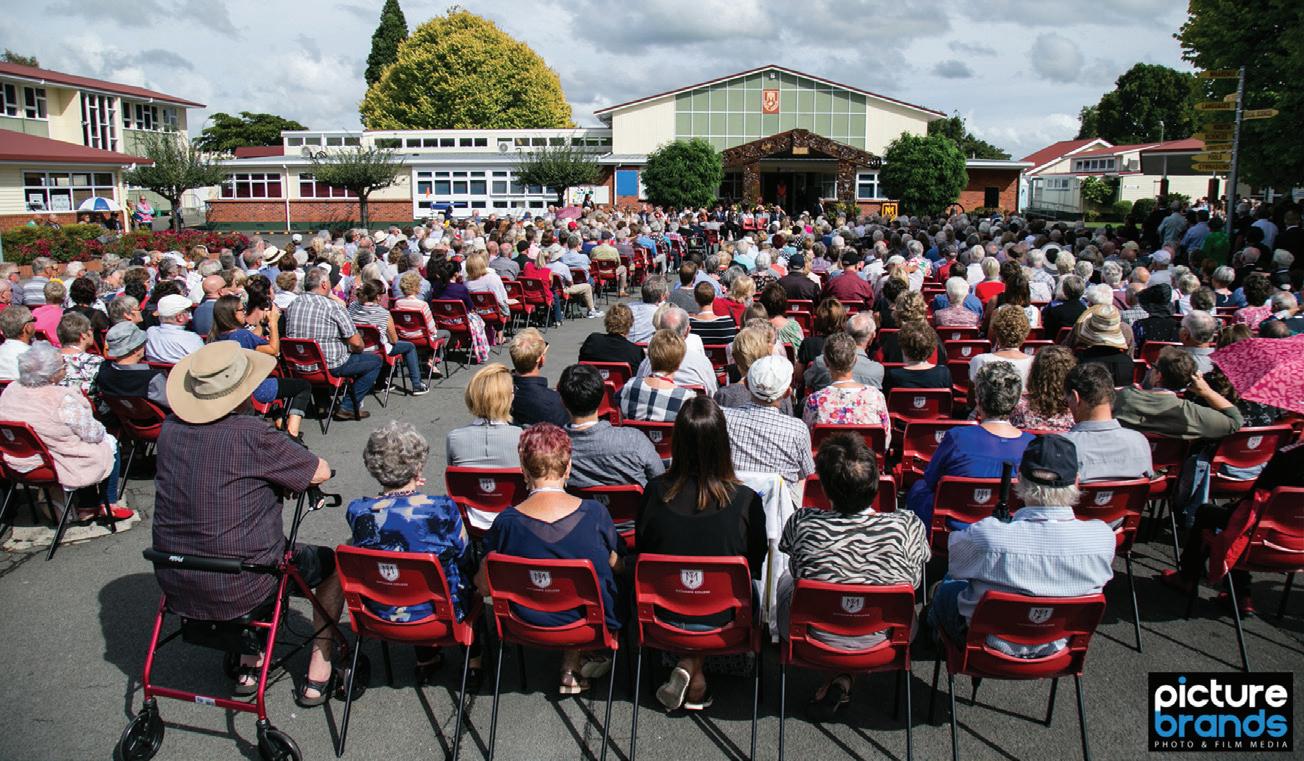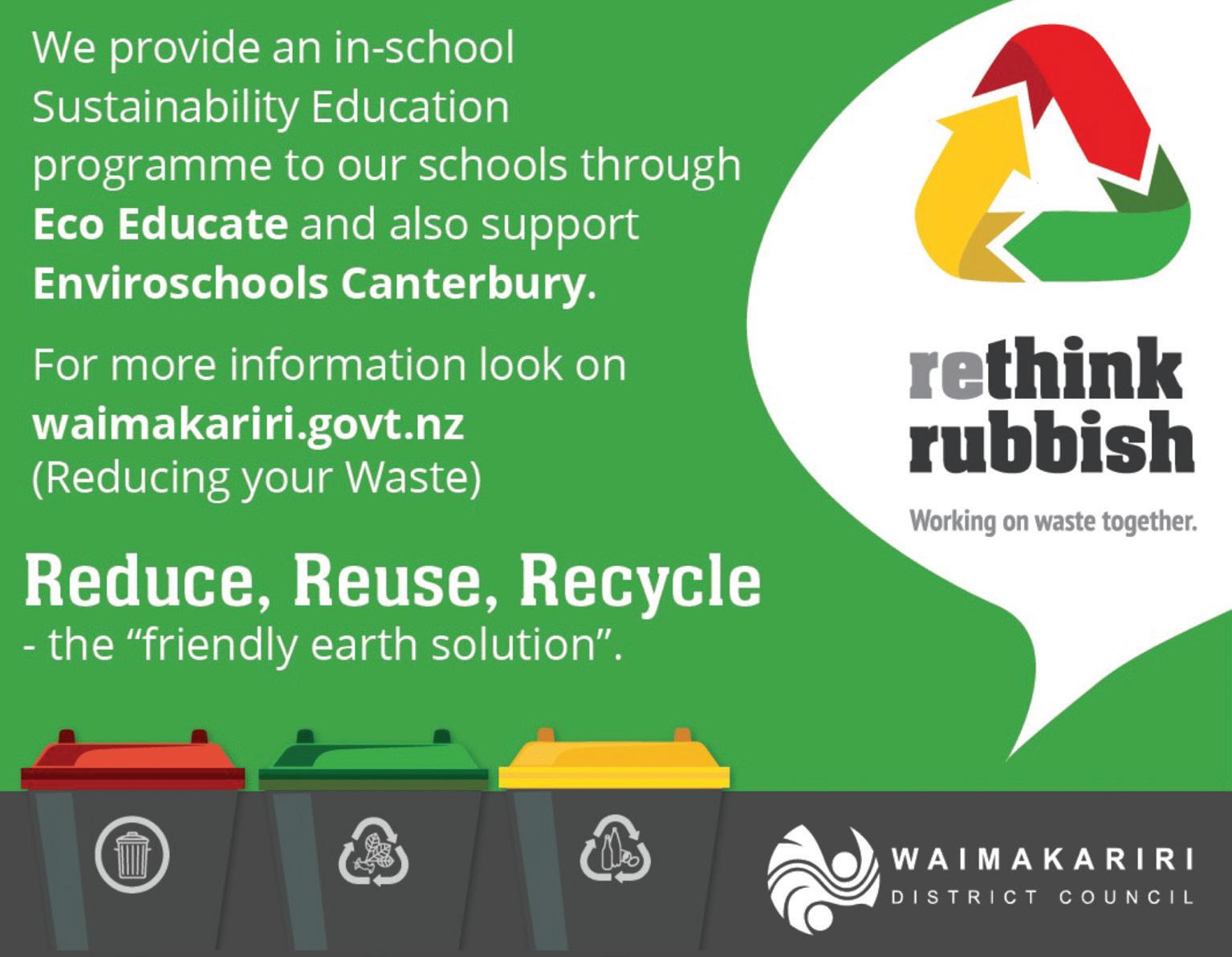
7 minute read
SCHOOL CENTENARY CELEBRATIONS
School centenary celebrations – the keys to success
Special events are important in the life of a school. They reflect the character of the school and provide promotional opportunities, yet they are largely reliant on fundraising and volunteers to stage them.
These events can also pose a financial risk to the school. The organisers rely on a contribution from a range of stakeholders so prudent governance decisions regarding investment, time, and dedicated resources are critical. Two facilitators from the Southern Institute of Technology (SIT) have undertaken a case study of the 2018 Matamata College Centenary Celebrations to gain insights into the event and its planning process. From March 23 – 25, the college welcomed more than 1,700 past students and staff, plus the community joined in a range of celebrations. The centenary was self-funded through a centenary organising committee made up of volunteers, past pupils and staff, parents, a few teachers, the principal, and the chairperson of the Board of Trustees. Two paid professionals, an event manager and an IT specialist were contracted. To gain a retrospective insight the SIT researchers focused on three areas:
1.The resources utilised in the planning process, including the contribution from volunteers, paid staff, and stakeholders. 2.The role of an online presence and social media. 3.The downstream benefits for
Matamata College. The researchers accessed secondary data from internal records and post-event evaluation forms; and primary data from 12 semi-structured interviews (SSI) with college staff and members of organising committee.
KEY FINDINGS FROM THE CASE STUDY

RESOURCES
• Having paid professionals on the organising committee was strongly supported by interview respondents, particularly an experienced event manager to navigate the myriad of compliance issues: health and safety compliance, insurance, risk analysis, building consents, fire authority and adherence to government and council bylaws • Volunteers from the staff, parents, and the community were hard to recruit. Attrition through the 20-month planning period meant the organisers were continually recruiting. But, as is consistent with events of this kind, there was a variance in the value of the volunteers’ contributions
• The low level of support received from the college staff could have been because many teaching staff live remotely so do not identify with the community, along with the heavy workload teachers have.
Current students participated in various areas and showcased their talents. They were also enthusiastic school tour guides • Both paid and unpaid personnel are invaluable to this kind of event, but it is important to match numbers and skills with what is affordable.
SPONSORSHIP/PARTNERSHIPS
• There was heavy reliance on sponsorship (paid and in-kind), to fund the event and cover the cost of the contracted staff. This was achieved through a professional sponsorship approach which ensured sponsors received appropriate recognition. The contribution from the community was generous, and a rugby club partnership provided the solution to beverages. Identified early on as an important revenue stream, the committee could not manage it themselves. By partnering and sharing the profits, the rugby club brought manpower plus strong connections with suppliers.
This was highly successful for both parties. stage’ to reach the target audience.
However, traditional media and local advertising were important to cover the transgenerational gap • To support the website registrations and online promotion, the manual registration office was deemed essential, not only for the older guests but for those who preferred face to face interactions
• Regular email or mailed updates across the generations provided information and built anticipation.
BENEFITS TO THE COLLEGE
• There were internal and external benefits. In addition to the college’s regular facilities management programme, the grounds and buildings were spruced up. School tours were hugely popular and provided an insight into how students are prepared for life in the 21st century. Matamata College could celebrate the past, plus showcase the present and future • Feedback from the SSI within the college included comments around improved culture and pride, healthy enrolments, and an enhanced image • There is evidence the event contributed to enhanced community cohesion. The partnerships, networking, and
‘multiplier effect’ noted over the weekend grew Matamata’s community spirit • The organising committee was congratulated on hosting a successful and safe event.
Financially, the committee broke even and provided a legacy for future celebrations.
The importance of sponsorship, partnerships, compliance and suppliers were highlighted, and these should be handled by an experienced professional. In general communications the use of social media as the primary medium worked well, but the committee had to recognise channels which worked inter-generationally. The direct benefits received by Matamata College included a blueprint for future events, profile raising across the district and an enhanced reputation. These findings are likely to apply to schools at all levels which are considering organising a similar celebratory event. Based on both the existing literature on this topic, plus these findings, it is evident that an event such as this centenary celebration is a large and complex undertaking. It is one which requires substantial support from the school in conjunction with an appropriately sized group of enthusiastic and capable volunteers to be successful.
The Waimakariri District Council offers waste minimisation and water management education programmes to schools, preschools and other early education providers throughout our District, facilitated by Enviroschools Canterbury and Eco Educate Ltd.
Some schools and preschools have chosen to join the Enviroschools programme, which is delivered in partnership with Environment Canterbury, and which takes the school - and the wider school community - on a journey to being more sustainable. They develop a vision of where they want to be, and plan a range of programmes and initiatives to get there.
These can include doing waste audits then setting up waste diversion systems, introducing waste-free lunchboxes, and so on; creating compost and using it on their gardens, where they can grow food for the school and even the wider community; installing rain-water capture systems to store water to irrigate their gardens; look at journey planning and seeing if they can cut down on use of cars to get to and from school; planting more native and flowering plants on the school grounds to provide food and shelter for birds, bees, butterflies, and so much more.
All schools and preschools can call on the sustainability education contractor (Eco Educate) as needed to deliver tailored classroom sessions to their pupils, to facilitate a site tour to the Southbrook transfer station and resource recovery park, or to tour one or more of the Council’s wastewater plants, water supply sites or the Northbrook stormwater management area. The messaging of these sessions can be around the waste hierarchy (reduce, reuse, repurpose, recycle, recover and residual waste), water conservation, and what not to flush or pour into sewer or stormwater pipes or systems, or a combination of these.
The classroom sessions are tailored to fit the school’s curriculum needs, for example they can cover mathematics (waste audits help with counting, measurement and calculation of ratios), textiles (creating bags out of t-shirts or rag rugs from old clothes, or repurposing soft toys), and persuasive writing (e.g. to ask companies to change their packaging type from an unmarked plastic to a recyclable material).
Eco Educate also provide help to design waste diversion and water capture systems in schools and preschools, and can also assist with finding materials for pupils to repurpose, up-cycle and reuse to build those systems. As an example, recycling crates or baths can be adapted for use as worm-farms, a desk can be turned into a community ‘seed swap station’, and plastic 200 litre drums and PVC piping can be used for rainwater capture and storage systems.
Information about these school education programmes, and advice about reducing waste in schools, can be found on the Council’s website at https://www. waimakariri.govt.nz/services/ recycling-rubbish-and-organics/ reducing-your-waste
The Council also provides additional recycling bins to schools that are located inside our kerbside collection areas, to help divert recyclable materials from their rubbish bins, under the Assisted Recycling Programme for Schools. Application forms are available on request to the Council’s Solid Waste team at
solid.waste@wmk.govt.nz

Lesley Ottey from Eco Educate sorting out the waste

Worm farm made from a bath on a wooden frame















